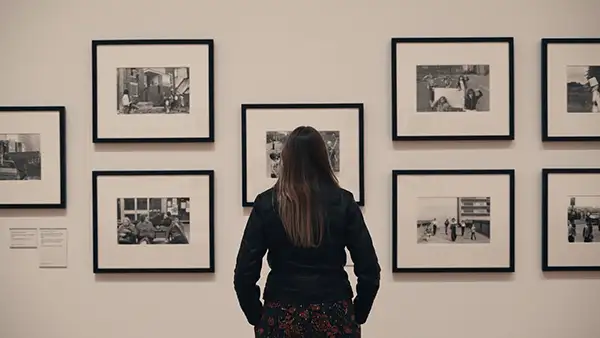We interview documentarian Paul Sng, whose latest film, Tish, tells the story of working-class British artist Tish Murtha.
Less than a decade after he burst onto the scene with 2015’s Sleaford Mods: Invisible Britain, British-Chinese filmmaker Paul Sng is at the top of his game. His new film, Tish, is the latest in an impressive line-up of documentaries from the prolific director, once again tackling urgent questions around poverty, social injustice and artistic expression.
Tish tells the story of Tyneside photographer Tish Murtha, whose powerful portraits of working-class British life from the 1970s onwards captured with empathy and humour the social issues of their times. Murtha was not immune to such issues herself; when she died of a sudden brain aneurysm in 2013, she had been living in poverty. She is survived by her daughter Ella, who we see throughout Sng’s film, flicking through her mother’s photographs and conversing with her relatives, friends and mentors.
The experience of trying to make it as working-class artists that the Murthas and Sng share is what makes this documentary so powerful, as it deftly eschews the bourgeois ‘poverty is beautiful’ philosophy – to use the photographer’s own words – in favour of an intimate and authentic approach. We spoke to Sng about the film and the current state of affairs for working-class British artists. Read the interview below!
How Paul Sng started working on Tish
What was your first encounter with Tish Murtha’s work and how did that lead to you making this film?
Paul Sng: The first photograph I saw of Tish’s would have been Glenn [Tish’s brother] jumping onto the mattress. You’ve got all these kids on the council estate looking up at this boy jumping out of a window; I was captivated by it. It was something that I’d seen in my childhood, in New Cross [London] rather than Newcastle. I was always scared to do it myself, I always thought I’d end up with a broken arm or something. But it’s a really very familiar image to me, and what I really like about it is that all the kids are looking up at this boy and there’s a ventriloquist dummy looking at the camera. It’s quite unsettling. In one sense it could be a still from a horror film, but because Tish’s work is so empathic and tender, it doesn’t look like that. It just looks slightly sinister.
So I saw that, and then Ella and I, Tish’s daughter, knew each other online, but we’d never met in person. I was messaging her one day and said, ‘Have you ever thought about doing a documentary on your mum?’ And she said, ‘Well, I’ve been approached loads of times, but I’m not really interested. But let’s have a chat.’ So we had a lovely two-hour phone call, and then we met in person – this was during lockdown, so we had to wait until we were allowed to meet up again. We spoke about the kind of film we wanted to make, which was obviously a film about Tish and her work, but also a film that could speak to the present day and about who gets to tell stories from working class communities.

You clearly worked closely with Ella, who has a significant on-screen presence in the film. Did you always want her to have such direct involvement?
P. S.: Yeah, from the very beginning when we first started chatting, I said, ‘How would you feel about being on screen?’ and Ella was comfortable with that. Ella’s a private person and likes to keep herself to herself, but I think she is brilliant on screen. She’s very natural, she’s a great conversationalist.
At one point, the idea for the story was that Ella would meet people one by one, as they appeared in Tish’s life. But once we got into the edit, it wasn’t quite working out narratively; we were finding that there were going to be gaps in our story. There was also more of a road movie element to it in the beginning. I’ve got lots of unused footage of Ella in cars and on trains, but ultimately it took a different direction.
There are some brief reconstructions of scenes from Tish’s life. What were you looking to achieve with these?
P. S.: We needed to bring Tish to life, because while I think Tish’s work shows one side of her, we needed another element to break up the images a bit. So we talked about how Tish can come to life and initially we thought of creating a memory space; you’d be in these rooms that Tish and Ella had lived in. But it wasn’t designed to be traditional recon in that these were actual moments, it was more like a reimagining.
We were very lucky that a production designer called Richard Drew, a Tish fan, offered us the set from a show he was working on called After Life, the Ricky Gervais thing. Usually they demolish sets after they’re finished with them, but he said ‘Yeah, we’ve got all this material. If you let me know wherever Tish lived, I can get the schematics and I can design it and then you can build it.’ So we built it in an abandoned M&S on Darlington high street. It’s designed to be a space where the audience gets a real sense of Tish, we’ve got an actor playing Tish’s physical presence, and then we’ve got Maxine Peake reading from her notes and her diaries and her letters and stuff. No archive really exists of Tish, so we had to have a way of giving her a presence in the film.
Paul Sng on working with Maxine Peake and the politics of Tish
You’ve collaborated with Maxine Peake before. What did she bring to the table as the voice of Tish?
Paul Sng: I’ve been very lucky to work with Max twice now. The first time we worked together was on a film called Dispossession, about the housing crisis, and she did a brilliant job. I think although Maxine’s not from the northeast, she is a working-class woman from the north of England and shares Tish’s politics. I think it was important for us to have somebody who had not only the ability to provide the voice work, but also to get under Tish’s skin, not only as an artist and a person, but as somebody who was very political. She already had all of this knowledge and this fire within her that Tish had.
Do you consider Tish a primarily political film?
P. S.: You can’t really separate Tish from her politics, and that’s a good thing. Ella and I, when we first met, spoke about not wanting to dilute any of the politics and then when we sat down with Jen [Corcoran, producer], she completely agreed. If Tish hadn’t been a photographer, I imagine she might have been a writer. She might have been an artist. She was an activist. I think she would have always been political, so trying to separate the film from being a political documentary would be impossible. It’s what informs all of her work; she wanted that camera to be a weapon, to document inequality, and then not merely hold up a mirror to society, but also to interrogate society, to question what she refers to as ‘dark forces’ who were governing the UK at the time and, let’s face it, still are.
Paul Sng on making documentaries about artists
This isn’t your first time making a documentary about social issues through the lens of someone’s artistic output. What attracts you to making films about fellow artists and creatives?
Paul Sng: I’m interested in artists who are lesser known, artists that have got a cult following or have found an audience but have not really got that mass audience. I think those kinds of artists interest me because I’m always interested in outsiders and their stories. Whether it’s Poly Styrene or Sleaford Mods or Tish Murtha, these are very special, brilliant artists that didn’t cross over into a mainstream audience in the way that somebody like Lady Gaga or Martin Parr did. I think that is because their work is more esoteric, it’s not designed to appeal to a mass audience. A lot of pop music is designed with that in mind, and sometimes when you do that you make compromises and the integrity of the work can suffer. I’m very interested in the idea of the ‘pure’ artist and I think all of the people I’ve made films with had that quality.

Do you see a lot of yourself in those artists? Do you share that philosophy?
P. S.: I guess so. I mean, I wouldn’t put myself up there with any of them because they’re obviously great artists and as a film director, I don’t think of myself in those terms. My role as director is that of a collaborator. For me, it’s important to have a producer, an editor, a cinematographer, and the team around you, and we all work together.
I’m under no illusions about being one of those great directors that I really like. There are people out there like Lynne Ramsay or Andrea Arnold or Martin Scorsese, who are brilliant, amazing directors with such great artistry to their work. I’ve always seen myself more as a collaborator, somebody who has an idea and a vision and can articulate that through working with other people. That’s where the magic happens.
I would say that what I do share with [artists like Tish Murtha] is a distrust of the mainstream, a questioning of the regular order of things and that outsider nature. I certainly would consider myself an outsider.
How things have changed since the events depicted in Tish
How did your experience of getting started as a working-class creative compare with Tish’s?
Paul Sng: I think Tish and I probably went in reverse. She started out with all of this promise and gradually over time was worn down by the system, by the rejections, by her refusal to compromise. She was stubborn, she was tough, and those are good things, you know, she was true to her principles. And if she’d started selling out when she was younger, and taking a different direction, we might not be making this film. Yeah, a lot of people would have heard of her, but would she have been happy? That’s the big question. Would she have been able to do that? I don’t think so.
For me, the background I came from as someone who didn’t really see myself – a working-class, biracial person – represented in the medium that I eventually got into, I kind of gave up before I even gave myself a chance to fail or succeed. I did music for a while, I was in a couple of bands, and then drifted through a series of admin and retail jobs. But then I got my opportunity later on, when I was already into my late 30s, and made the film about Sleaford Mods, and from there things have developed. So it was like Tish’s story in reverse: starting out, not really having the belief in any of it, and then gradually finding a path to do it.
How have things changed?
P. S.: It was getting better for a while, but I think it might have plateaued a few years ago. I think it’s harder now. Not that the world is harder now than it was in the ‘80s, but back when Tish was making work, you could sign on, you could get benefits and you wouldn’t be constantly being hassled to do, as Radiohead say in ‘No Surprises’, a job that slowly kills you. Now a lot of people do have to take those roles because they’re under pressure; there isn’t the same freedom to be an artist. Funding is much harder now than it was too, obviously because there are cuts, but also because there are more people trying to do stuff.
I think the advantage that we have today as artists, whether you’re a filmmaker, a musician, a photographer, is the technology is more affordable. So if you’ve got a camera phone, you can take photographs, you can technically make a film. I think with distribution, the democratisation of the internet has given us a means for our work to be seen. The key trick now is curation; who gets to pick and choose what gets seen and how you get your work out there? With social media, you don’t necessarily have to go via conventional means of doing things. So what is harder is funding and making a living. What’s easier is the actual making of the work and getting it seen, so maybe it levels out.
Paul Sng looking to the future
Are you hopeful for the future?
Paul Sng: You have to be. I think we’re living through really desperate times and I think people always need hope. It’s quite a trite thing to say, but if everything seems lost and you think that you can’t do something, then you ain’t gonna do it. I suppose what I’ve tried to do is to not wait for permission to make things, whether that’s through doing kick-starters or being able to somehow scramble stuff together.
I don’t see hope in politicians, but I do see hope in communities and people looking out for one another, and I see hope in a lot of artists who are managing to still make work. But I think it’s going to be very, very tough over the next few years and I think we’re going to see a lot of people that should have been making art be lost to us in a way that Tish was. I think it’s really important as a community, whether you’re a filmmaker or an artist or a musician, that people value that solidarity for one another, because without it, you’d just be this lone voice in the wilderness.
What’s next for you?
P. S.: I’ve got a film called Am I Irvine Welsh, a feature documentary that follows a year or 18 months in one of the busiest periods of [novelist Irvine Welsh]’s life, and we observe him at work and at play. In the film he takes DMT, legally, in Toronto and it triggers an exploration of his mind, of his work, of his beliefs, his history, everything else. And then the rest of the film is him doing what he does, meeting his collaborators, people like Brett Easton Ellis for example, and then hanging out with his pals, hanging out with his wife, DJing and various other stuff. So that will hopefully be out in early to mid-2024. We’re in the edit for that now; it was a good one to work on.
This interview has been edited for length and clarity.
Paul Sng’s Tish will be released in UK & Irish cinemas on 17 November 2023. Read our review of Tish!

 loudandclearreviews.com
loudandclearreviews.com
